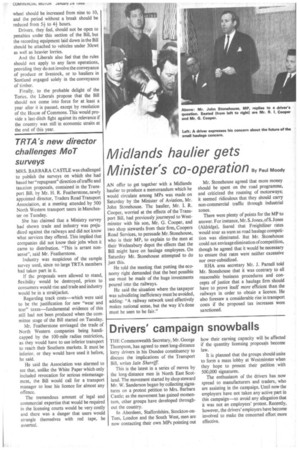TRTA's new director challenges MoT surveys
Page 21

If you've noticed an error in this article please click here to report it so we can fix it.
MRS. BARBARA CASTLE was challenged to publish the surveys on which she had based her "repugnant" direction of traffic and taxation proposals, contained in the Transport Bill. by Mr. H. R. Featherstone, newly appointed director, Traders Road Transport Association, at a meeting attended by 500 North Western transport users in Manchester on Tuesday.
She has claimed that a Ministry survey had shown trade and industry was prejudiced against the railways and did not know what services they offered. This implied that companies did not know their jobs when it came to distribution. "This is arrant nonsense", said Mr. Featherstone.
Industry was suspicious of the sample survey used, since no large TRTA members had taken part in it.
If the proposals were allowed to stand, flexibility would be destroyed, prices to consumers would rise and trade and industry would be in a straitjacket.
Regarding track costs—which were said to be the justification for new "wear and tear" taxes—fundamental evidence of this still had not been produced when the committee stage of the Bill started on Tuesday.
Mr. Featherstone envisaged the trade of North Western companies being handicapped by the 100-mile radius restriction, as they would have to use inferior transport to reach their Southern markets. It must be inferior, or they would have used it before, he said.
He said the Association was alarmed to see that, unlike the White Paper which only included revocation for serious mismanagement, the Bill would call for a transport manager to lose his licence for almost any offence.
The tremendous amount of legal and commercial expertise that would be required in the licensing courts would be very costly and there was a danger that users would strangle themselves with red tape, he asserted.












































































































